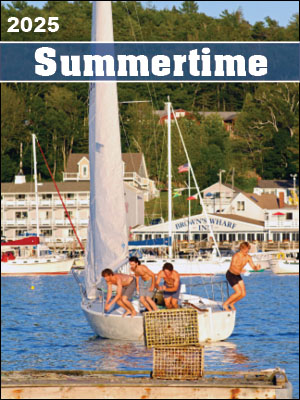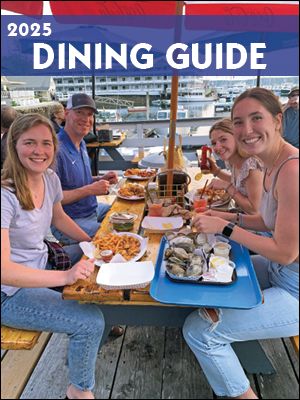Appeals board considering more evidence in CMBG hearing
The Anthony family’s appeals board hearing is going into overtime. The board scheduled an additional meeting Aug. 31 after a Barters Island Road resident urged it to review a 2014 Wolfeboro, New Hampshire lawsuit involving Topsham engineering firm Wright-Pierce.
During the fourth hearing’s public comment section, Paula Arsenault encouraged board members to review details of the lawsuit in which Wolfeboro won $6,795,000.
Wright-Pierce is consulting Coastal Maine Botanical Gardens on its $30 million-plus expansion project already under way. In December, the Boothbay planning board approved a permit for the expansion. The Anthony family appealed the planning board’s decision. In three previous hearings, neither the appellant nor respondent mentioned the Wolfeboro case. Arsenault believed the case pertained to Boothbay because Wright-Pierce designed the failed septic system.
Arsenault asked Wright-Pierce engineer Jan Wiegman to comment on the lawsuit, but he declined. “I’m not going to answer to that,” Wiegman said. Later in the meeting, appeals board lawyer John Shumadine questioned the New Hampshire case’s relevance to the proceedings. “He (Wiegman) had no knowledge this was coming up tonight, and I wouldn’t have answered, either. I don’t think anyone would,” he said. “If you want to bring it up, the parties should have a chance to prepare and talk about it first.”
Later, Wiegman explained his decision. He said he didn’t know any of the lawsuit’s details and the Wolfeboro septic system was different than one designed for the Botanical Gardens. The board’s decision resulted in adjusting the hearing schedule. The next meeting is at 6 p.m. on Thursday, Sept. 21. Opposing lawyers will spend 30 minutes discussing the lawsuit before proceeding to five-minute closing statements. The board will then proceed to deliberations.
The five-person board will deliberate before informing its legal representative, Shumadine, how it wishes to proceed. Shumadine will draft a ruling regarding the majority view and an official vote will take place at 6 p.m. Thursday, Oct. 4.
The Aug. 31 hearing was supposed to be the last prior to deliberations. CMBG presented its rebuttal to the Anthony family’s case made at the last meeting. On July 28, Vaughn and Jodie Anthony along with their sons, Jason and Kevin, contended the planning board erred in December by granting a permit. The Anthonys challenged CMBG’s assertion it was an educational facility and had complied with local and state ordinances regarding erosion controls and storm water runoff.
On Aug. 31, lawyer Mary Costigan gave CMBG’s rebuttal. She provided board members with a court decision ruling earlier in the year siding with CMBG’s assertion it is an educational facility. The Boothbay Region Water District sought a court decision to halt CMBG’s expansion project during the appeal process.
The water district contended CMBG was a museum, which Boothbay’s land use ordinances prohibit in the Knickerbocker Lake Watershed. In rejecting BRWD’s motion, District Court Judge Dan Billings ruled CMBG was more “like an educational facility.”
“A court has already ruled against an argument that it’s not an educational facility,” Costigan said.
Part two of the rebuttal centered around arguments regarding possible phosphorus contamination of Knickerbocker Lake from runoff created by hundreds of additional paved parking spaces in the watershed. Last month, Kevin Anthony contended two studies, one commissioned by the town of Boothbay and one by BRWD, showed that the Maine Department of Environmental Protection used “faulty and outdated methods” in calculating allowable phosphorus runoff into the watershed.
“Our system eliminates about 80 percent of the phosphorus before it gets to the watershed. Also, there are other natural sources, like decaying leaves, contributing to the phosphorus levels,” he said.
Arsenault wasn’t the only member of the public to speak. Eight others spoke, seven recommending the board deny CMBG a building permit. BRWD General Manager Jon Ziegra spoke on behalf of his board’s trustees. Ziegra complimented CMBG on a previous decision moving the 10,000 gallon per day wastewater system out of the watershed. But he believed the Botanical Gardens should have engaged more in community efforts toward constructing a municipal sewer and water system.
“Throughout the process, I found them to be totally uncooperative with other entities in considering other options,” Ziegra said. “Since the construction began there have been repeated failures of erosion and sediment control threatening the nearby streams and wetlands. These concerns were brushed off as trivial matters or worse, sabotage. I’m disappointed in their unwillingness to partner with other entities and admit to errors. They need to remember, they are part of a community and need to work together, not wall themselves off with letters and press releases.”
CMBG President and CEO Bill Cullina disagreed with the BRWD’s position. He countered previous discussions with Boothbay officials resulted in concluding municipal water and sewer would be cost-prohibitive. “I spoke to the previous town manager who said it would never happen, too expensive,” said Cullina.
CMBG applied for a building permit last November to build a new visitors center, gift shop, horticultural center, conservancy and more gardens as part of its three-phase expansion project. The planning board approved a permit in December for phase one which includes improving Gaecklin Road, expanding parking, building the visitor center, upgrading utilities and building a pedestrian bridge.
Event Date
Address
United States





























